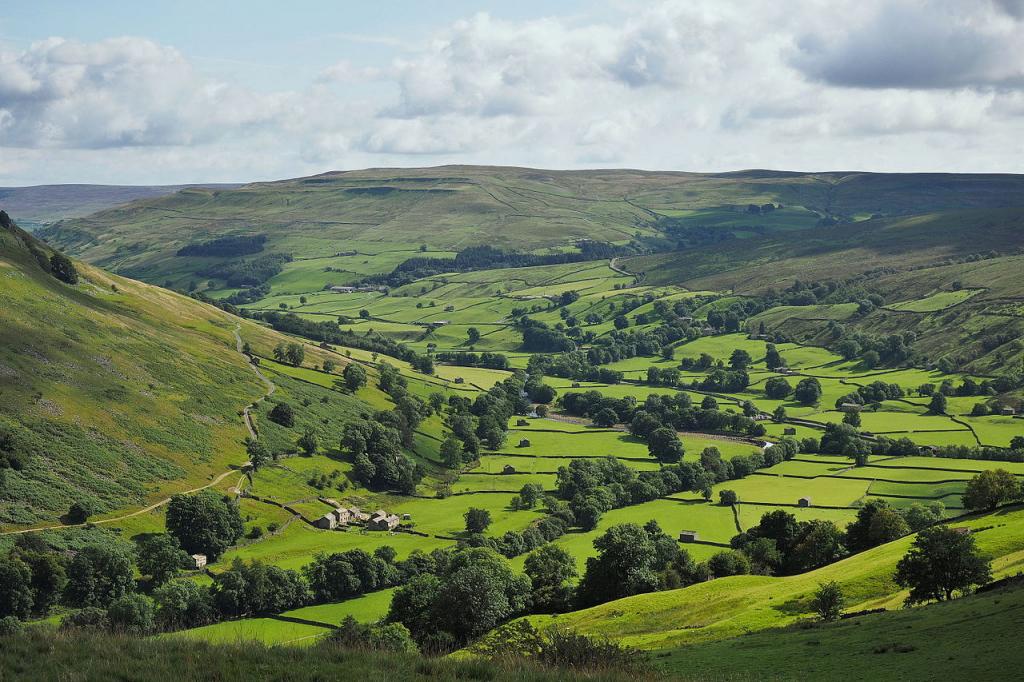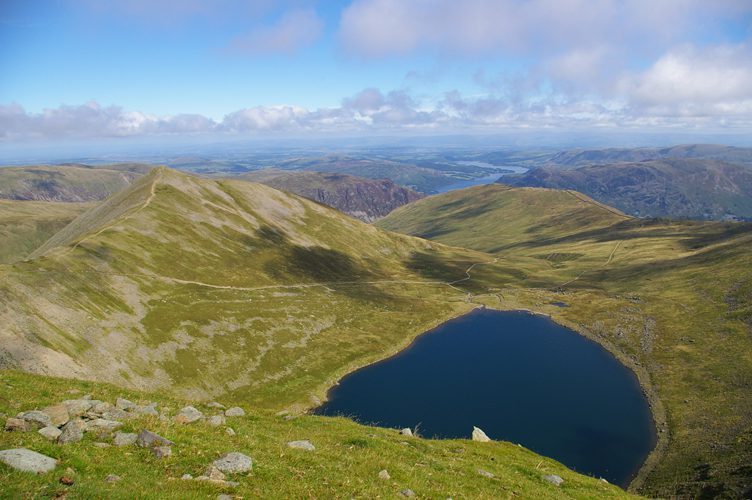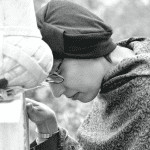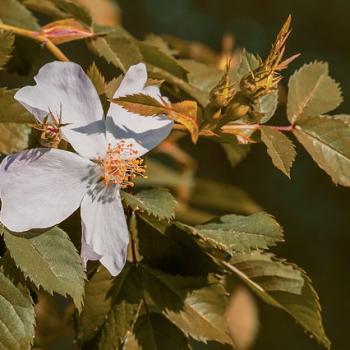
Once upon a time, I was terrified of views – distant hills, valleys, woodlands seen from a distance – all would make me feel like I was falling, unanchored and without gravity. As a young child living with my grandmother in a Yorkshire town full of green landscapes and a plethora of rolling hills and valleys, this was particularly difficult. My errands to the local grocery shop were fraught – the road I had to traverse had open views on one side to the valley, and cars and houses on the other. I would studiously keep my head down and eyes focussed on the cars driving past or the windows of the houses, mentally reducing the scope of my universe so that I wouldn’t start panicking. I didn’t always succeed – sometimes a rebel part of me would dare myself to look across the valley. And then my eyes would widen with panic as the beautiful view wavered before me and I started feeling myself falling, falling, as if I would take off and cartwheel through the air and blow across the valley. And the quieter it was, the more panicky I felt, so I concocted stratagems to help me ‘survive’ the view. I would wait for cars to pass; I would hum a song to myself; I would wait for the group of old ladies across the road to catch up with me; and I would run the length of the open section at a mad sprint, sometimes losing a few groceries in the process.
Nobody knew that I felt like this, and I never really dwelt on my feelings – it certainly didn’t stop me from doing my errands and I never planned what I would do. It would just kick in whenever I came to those open spaces.
And then there was the sky – the largest open view around! Thankfully, since it’s difficult to walk around looking up all the time, this could also be managed. But I was never very good at playing the popular childhood game of what-shape-is-that-cloud for very long. Clear blue skies were easier to gaze at, and fluffy white clouds were much preferable to the dreaded dusk clouds. As a teenager these ominous, giant shapes in the sky would oppress my walk home after school, where a large part of my path was open sky which my eye found difficult to avoid. Once I got so terrified I started crying, which at least helped blur my vision. But once again, as soon as I approached my house I wiped my face and forgot the intensity of what I had just felt.
Coupled with severe hay fever and asthma, this made me a mostly indoor child, happy reading through copious amounts of literature during the summer months (…and all the months).
Later in high school, an observant friend noticed more than I realised and brought me a newspaper clipping she had come across. It was a very brief dictionary description of agoraphobia (which in those days was limited to fear of open spaces as opposed to the more wide-ranging triggers recognised today).
Feeling slightly better that I wasn’t crazy, I accepted my phobia and just as quickly dismissed it (preferring not to dwell on my vulnerability). At university and then during my early working life, I was surrounded by tall buildings morning till night, day after day. I never thought about my phobia, but it came back to me quite dangerously in my twenties when I was driving a friend back from a wedding in the North: I drove round a bend down a new road that dramatically opened up to a wide expanse – a double whammy of rolling hills within a valley and looming dusk clouds. My hands froze on the steering wheel but thankfully my brain managed to keep driving safely until I had brought my hyperventilation under control and my mind no longer felt like I was going to fall, car and all, into the sky. I quickly retreated back to the city and forgot about it.
Then, when I was introduced to Sufism and started exploring the Quran for the first time, I kept coming across references to God’s signs in nature; the variety of creation, the high mountains and low rivers. And, while intellectually I understood it, I had no interest in actually going out to find God in nature.
Don’t they look at the sky above them?
How We have made it and adorned it
and how there are no flaws in it?
And the earth—We have spread it wide
and firmly established mountains on it
and caused it to bring forth every kind of beautiful growth,
so offering an insight and a reminder
to every human being who willingly turns to God.[50:6–9]
Then I met my now-husband, a complete nature-lover, born in Cumbria, home to the Lake District, which back then I thought was quite pretty and hilly, the reality being that it’s actually stupendously gorgeous and looks like the The Lord of the Rings movies. While visiting his parents’ home, I climbed my first mountain. Helvellyn is the third highest mountain in England, and the ridge to the peak, called Striding Edge, has claimed the lives of many hikers on windy days. However, I knew none of this beforehand!
I will never forget the moment when we reached the first stopping point, took our gaze off the path, and looked behind. My breath caught and my jaw dropped as my brain took in the immensity of the view – clear mountain ranges and vistas of blue sky between the rolling clouds. The silence was deafening, with the occasional breeze. In that moment, I experienced awe of God; I saw God laid out before me; I felt God, in Majesty and Power, in Beauty and Abundance. For the first time I understood the meaning of awe – Awesome, Awe-inspiring, Awesomeness:
“a feeling of great respect sometimes mixed with fear or surprise.”
[Cambridge Dictionary]

I had been raised with the concept of a fearsome God, but the surprising God was now revealing Itself to me. My desire to experience more of God’s creation had definitely awakened, and since that day I haven’t experienced the same fear in open spaces.
To all who stand in awe, a revelation from Him/Her
who has created the earth and the high heavens,
the Infinitely Compassionate One,
seated on the throne of His/Her almightiness.[20:3–4]
Years later, we found ourselves making Cumbria our home and I was surrounded by natural beauty. I think back to my childhood – limiting my vision so as not to catch the wide view and ‘fall in’, and I wonder at how I was unable to encompass all that was on offer. Particular factors in my home environment did not encourage an open and curious nature that cared for beauty. I focussed only on a narrow world-view that protected me; appreciating nature was not a useful survival tool. Now, I find myself amazed by every view – green or grey, hills or slate-stone houses. Shortly after we moved to Cumbria, we attended a local community event and a local asked me how I liked my new home. I found myself extolling the beautiful subtlety even of the grey, rainy days, how each hue of grey was beautiful in and of itself. It took at least five minutes for me to notice the fixed expression on the person’s face as they looked for a break in my monologue to make their escape.
My opening to God’s beauty has come through seeing this beauty reflected in my teachers, my companions and my spiritual tradition; and then witnessing it with clear eyes around me. Yes, it helps to be in beautiful surroundings, but even in busy cities we can find beauty in every moment and shape – in all the grey hues of concrete and shiny towers, always pointing beyond to the greater expanse of the whole of creation.
And on earth are signs for those of inner certainty,
and within yourselves.
Will you not then see?[51:20-21]
What triggers these reflections has been my new daily reading companion, Ninety-Nine Names of the Beloved, by Shaikha Camille Hamilton Adams Helminski, which I will explore further in my next article. For now, I would like to leave you with her poetic reflection on Al Matin, which seems to me the best antidote to agoraphobia: to feel grounded, rooted, steadfast, and anchored in reality; to not fear losing my hold on the world.
Al Matin, The One Who Is Ever Steadfast, Everlastingly Strong
Ya Matin, Ya Badi
Your Joy
is coming to the mountainside,
Ya Matin,
with every sunrise.
The breeze of dawn
kisses the shores
of Your hills,
and every day they display
Your Light,
and generous shadows,
in the folds of their skin
where rivers run
and waterfalls tumble
with Your Grace.
Anchoring our world,
they hold Firm in Your Power,
reaching to heaven
with their pyramidal peaks
peeking through
the veils of clouds
to know You
in intimate sky chambers.
As above,
so below.
Their feet, too,
know Your Presence
as deep veins connect
the core of Your Love’s traversal,
O Badi,
Most Skilful Creator!
Nightingales burst into song,
perched
upon the trees that rise
so strongly into the fullness
of Your air.
With iron You fortify us
and strengthen our resolve
to see You
everywhere;
with gold You adorn us,
with Your Light You magnify us,
as we stand with the mountains
in the Glory of Your Dawn,
opening our arms
for Your Embrace,
Ya Wasi,
Ya ‘Aziz,
Ya Wadud,
Ya Salaam.Ya Matin, O You Who Are Ever Steadfast, Everlastingly Strong,
Ya Badi, O Skilful Creator
Ya Wasi, O All Encompassing One,
Ya ‘Aziz, O Almighty, Most Dear,
Ya Wadud, O Infinitely Loving One,
Ya Salaam, O You Who Are Peace
Quran passages taken from Ninety-Names of the Beloved by Camille Hamilton Adams Helminski












